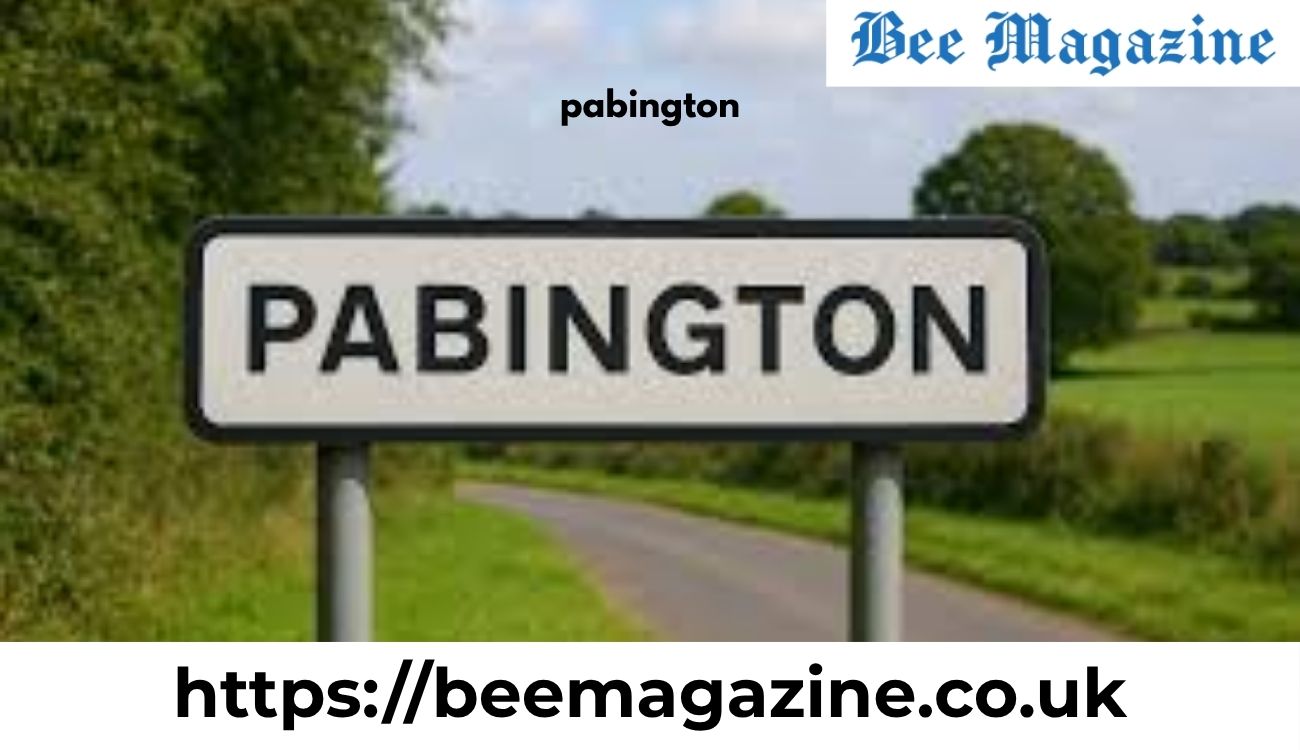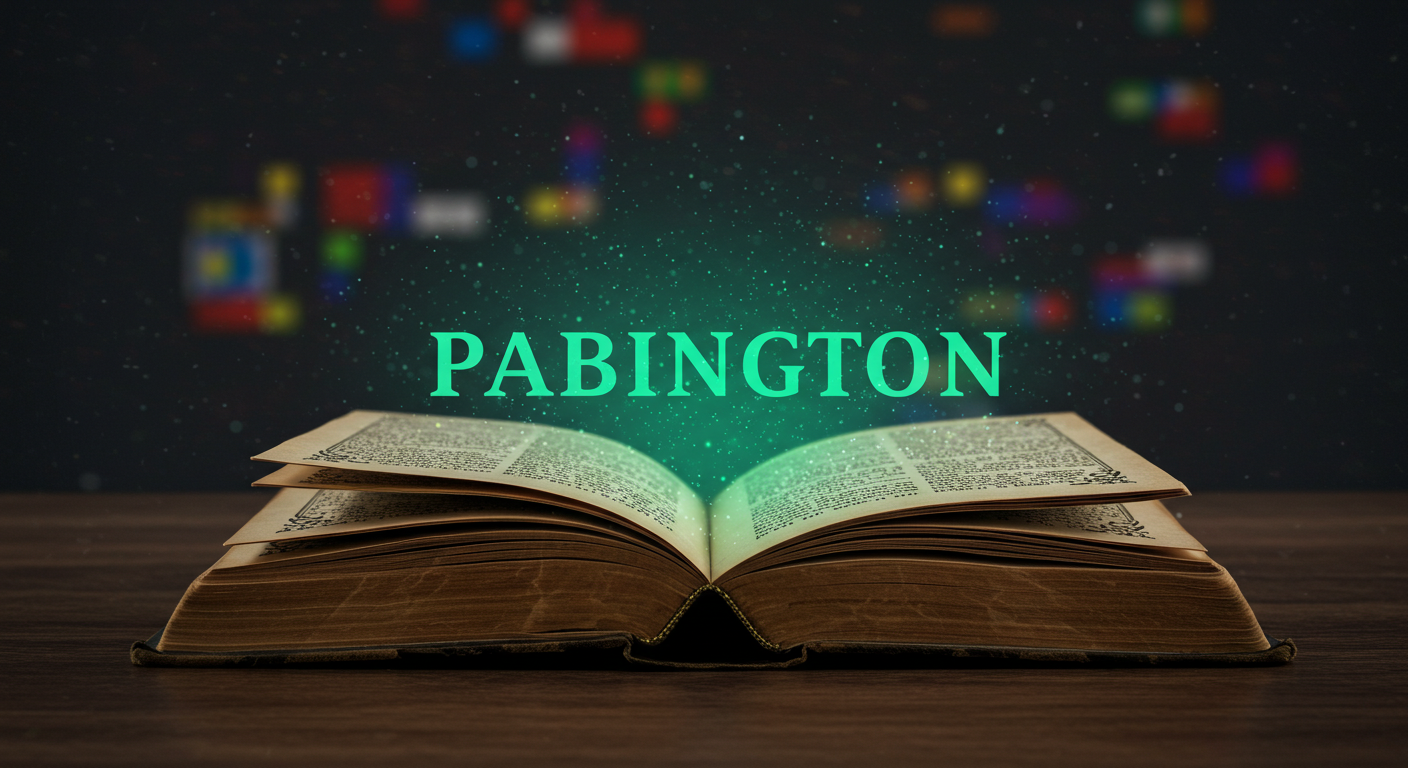Entertainment
Exploring Pabington: A Hidden Gem Making Headlines

In 2025, the term Pabington has emerged across the digital landscape, sparking curiosity among linguists, bloggers, travelers, and trend-watchers alike. Often described as a hidden gem, Pabington is not found on mainstream maps or encyclopedias, yet it’s gaining attention on niche platforms, creative spaces, and genealogy records. But what is Pabington? Is it a town, an idea, a cultural reference, or a linguistic evolution? This article explores the multifaceted nature of Pabington, its digital footprint, historical echoes, and potential future as a recognized cultural or linguistic entity.
Let’s dive into what makes Pabington so fascinating—and why it may be much more than just a buzzword.
Origins and Meaning of the Word “Pabington”
The word Pabington does not currently exist in major dictionaries like Oxford or Merriam-Webster. Instead, it appears to be a neologism—a newly coined term without an officially recognized definition. Its earliest digital footprints trace back to obscure blog entries, online usernames, and fictional storytelling projects, where the term is used creatively, often as a place name or character identity.
Some etymological clues suggest it may be inspired by similar-sounding English place names like Paddington, Abington, or Babington. However, “” stands on its own as a flexible term—shaped more by user intent than historical accuracy.
Is Pabington a Real Place? Sorting Fact from Fiction
Despite some travel blogs referring to as a “quaint village” or “forgotten town,” there is no official geographic recognition of a town or settlement named in the UK, US, or elsewhere. Encyclopedic resources like Wikipedia and Britannica provide no entries on , which reinforces the idea that it may be fictional or metaphorical.
However, this ambiguity has not stopped creators from treating as a mythical or symbolic location, much like Tolkien’s Middle-earth or the fictional town of Hawkins in Stranger Things. In that sense, may be part of a rising genre of creative digital storytelling, rather than a misreported real-world village.
Pabington as a Surname: Historical Records and Genealogy

While Pabington isn’t recognized as a place, genealogical records do show rare occurrences of the surname “,” especially in UK census documents from the 19th century. This suggests that the name may have originated as a family surname, possibly derived from regional dialects or phonetic spelling variations of better-known names.
This lineage perspective adds depth to the word’s evolution. It may have once identified real people, later adopted by digital users in modern times as a username, brand, or fictional persona.
The Digital Emergence: How “Pabington” Spread Online
New words often take root in online communities, where language evolves rapidly. The internet—especially social media, forums, and blogging platforms—has become fertile ground for neologisms like to flourish. The term now appears in:
-
Creative fiction blogs
-
Art-focused social media profiles
-
Conceptual branding projects
-
Niche content pages labeled “digital storytelling” or “urban fantasy”
As of late 2025, has shown up in several independent blog posts and YouTube shorts where it’s framed as a “forgotten village,” “digital artifact,” or “living myth.” These contexts suggest intentional ambiguity—a creative decision rather than misinformation.
Confusion with Similar Names: Paddington, Abington, Babington
One reason for Pabington’s rise—and confusion—is its phonetic closeness to established names:
-
Paddington: A district in London and home to the famous Paddington Bear.
-
Abington: A real town name found in Pennsylvania (USA) and Northamptonshire (UK).
-
Babington: A well-known English surname and historic location.
Because of these near-matches, users often misattribute content, thinking is a typo or a variant. This confusion adds a layer of mystery and unintentionally boosts its visibility online.
Cultural Identity: Pabington as a Creative Construct
A key reason Pabington captivates audiences is because it represents a blank canvas—a term that can mean whatever the creator wants. Some projects describe it as:
-
A lost English hamlet that holds secrets
-
A symbolic name for inner transformation
-
A metaphor for digital life disconnected from the physical world
This kind of fluidity is common in postmodern storytelling, where places like symbolize more than geography—they become emotional or philosophical spaces.
Possible Uses in Branding and Media
From a branding perspective, Pabington offers value due to its:
-
Originality: Low competition in SEO makes it ideal for niche brand creation.
-
Ambiguity: You can define it how you wish—whether a location, brand, or product line.
-
Creativity: Its fictional roots allow for expansive narrative use.
Emerging indie creators have started using as a brand identity in podcasts, music releases, and even fashion concepts—particularly in art-house and alternative media scenes.
The Role of Neologisms Like Pabington
Neologisms like Pabington reflect how language adapts to cultural shifts. In 2025, internet culture continues to shape the creation and spread of words. Scholars studying internet linguistics highlight several drivers behind terms like:
-
Meme culture
-
Post-ironic storytelling
-
Anonymity and persona building
-
Globalized naming trends
could follow the trajectory of terms like “metaverse” or “altspace”—starting obscure and becoming mainstream as narratives coalesce around them.
Ethical SEO and the Pabington Dilemma
Given its vague status, writers and marketers should use Pabington responsibly in SEO and content creation. Ethical tips include:
-
Be transparent: Clarify that it’s a fictional or emerging concept.
-
Avoid clickbait: Don’t present it as a confirmed geographic location unless sourcing supports it.
-
Focus on value: If you’re using as a setting or theme, offer original and useful content.
This helps build trust and prevents spreading misinformation while still benefiting from the term’s novelty.
Tourism Fiction: Why “Pabington” Draws Travel Bloggers

Interestingly, some blogs describe visiting Pabington as if it were a real place, complete with landmarks, market squares, and festivals. These stories, while fictional, tap into the genre of tourism fiction—a creative form where authors construct entire travel experiences around imagined places.
Much like Italo Calvino’s Invisible Cities, these articles evoke mood and narrative rather than factual guides. It’s a literary device with visual, emotional, and experiential elements.
Potential for a Real-World Pabington
Given the buzz, one possibility is that someone establishes Pabington as a real-world venue or concept town—similar to themed villages or experience parks. All it takes is:
-
A community of artists or developers
-
A purchased plot of land
-
A cohesive story
This could make Pabington the first crowd-sourced fictional town turned real—a bold experiment in branding, tourism, and storytelling.
How to Use “Pabington” in Your Own Work
Want to use Pabington in your writing, game, or brand? Consider these ideas:
-
Storyworld: Build lore around a mythical village
-
Product Line: Use the name for artisanal or cottage-style products
-
Persona: Create a digital identity centered on the aesthetic
Just be upfront with your audience. Say what Pabington means in your context, and you’ll strengthen your credibility.
Conclusion
Pabington is a mystery, a metaphor, and a digital artifact all at once. It’s not defined in books or geography, but it lives in the imagination of those who use it. Whether as a surname, a fictional place, or an emerging brand, it reflects how modern culture reshapes language in real time.
By staying honest and creative, anyone can take part in shaping the story of Pabington—a word that may someday hold meaning far beyond its humble, undefined beginnings.
FAQs: about Pabington
1. Is “Pabington” a real place?
No, Pabington is not currently recognized as a real geographical location by official sources like maps, encyclopedias, or government records. While some blogs or fictional works refer to it as a “village” or “town,” these are creative narratives rather than factual claims. It’s important not to confuse it with similar-sounding real places like Abington or Paddington, which have well-documented histories.
2. What does the word “Pabington” actually mean?
As of now, “Pabington” has no fixed dictionary definition. It’s best categorized as a neologism—an emerging word with meaning shaped by users. Some use it to describe a fictional village, while others adopt it as a username or brand. The meaning is fluid and depends on context. It could symbolize creativity, mystery, or even identity in digital storytelling.
3. Where did the word “Pabington” come from?
The precise origin of “Pabington” is unknown, but it appears to have surfaced organically online. It may have evolved from real surnames or place names with similar phonetics, such as Abington or Babington. Historical records do show a few individuals with the last name , mainly in 19th-century UK documents, but the term’s current usage is more digital and metaphorical than geographic or genealogical.
4. Can I use “Pabington” in my own projects?
Yes, and in fact, that’s part of the appeal. Since isn’t trademarked or fixed in meaning, it offers a creative space for writers, artists, and marketers. You can use it in fiction, branding, or digital storytelling—just be transparent about its status. Don’t mislead readers into thinking it’s an established place unless you’re clear it’s fictional or metaphorical.
5. Will “Pabington” become more popular or enter the dictionary?
It’s possible. Many words start in niche circles and eventually gain mainstream recognition if usage becomes consistent and widespread. has already appeared in blogs, videos, and online handles. If more creators adopt it with a clear context, and if it garners enough public interest, dictionary editors could eventually consider it for entry—as they have with many previously “made-up” words now in common use.
-

 Celebrity8 months ago
Celebrity8 months agoMary Marquardt: The Untold Story of Harrison Ford’s First Wife
-

 Celebrity9 months ago
Celebrity9 months agoHow Old Is Roux Lopez? WWE Stars Becky Lynch & Seth Rollins’ Daughter
-

 Celebrity9 months ago
Celebrity9 months agoEllen van Lochem: The Quiet Force Behind AC/DC Legend Angus Young
-

 Celebrity9 months ago
Celebrity9 months agoKim Sexton Mattingly: The Woman Behind MLB Legend Don Mattingly
















